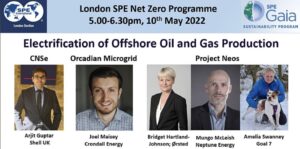The London SPE Net Zero Gaia committee, with thanks to our sponsors ERC Evolution, is very excited to showcase three projects that could be critical for decarbonising UK oil and gas production.
The use of gas and diesel to generate power, results in a huge proportion (approximately 70%) of the greenhouse gas emissions associated with oil and gas production offshore UK. It appears clear that a switch to low carbon power will be critical to meeting emission reduction targets. But the question is how? What are the issues converting brownfield facilities? Are large integrated, hub and spur, projects the solution? Should we be looking at a modular approach? Where do windfarms fit in? What new technology is needed?
These are just some of the questions we hope to answer in this highly topical webinar. To help us, we will be joined by representatives of three separate groups that are leading the way in developing solutions. Each will present on their projects and answer audience questions.
If you have an interest in how the UK oil and gas industry will meet its carbon-reduction target, then please join us for this webinar.
PRESENTERS
Arjit Gupta from Shell UK will represent the CNSe project:
- Central North Sea Electrification (CNSe) is collaboration between BP, Harbour, TotalEnergies and Shell aiming to decarbonise multiple offshore assets in central graben area via electrification. We aim to remove up to 800ktpa of GHG emissions starting 2027-28, contributing to the shared ambition of North Sea Transition Deal. The project team is currently evaluating multiple concepts, including Wind integration, and is aiming to take a Concept Select decision in July 2022.
Joel Maisey from Crondall Energy will represent the Orcadian Microgrid project:
- The Orcadian Microgrid concept provides a solution that transforms intermittent clean power into very reliable, low emissions, fully backed-up power. The Microgrid provides a scalable and easy to deploy solution, that simplifies electrification of individual or small groups of offshore assets, by reducing the project size and complexity. Our approach is founded on power from floating wind turbines, supported by highly efficient and responsive gas-powered generators with enough battery power to maintain a reliable supply.
Bridgit Hartland-Johnson from �rsted, Mungo McLeish from Neptune Energy, and Amelia Swanney from Goal 7 will jointly represent Project Neos:
- Project Neos is an industry-leading pre-Front End Engineering Design (FEED) study which has investigated the technical and commercial aspects of establishing an electrical connection between an Offshore Wind Farm (OWF) and an offshore Oil and Gas (O&G) installation. Its aim was to prove feasibility and cost effectiveness of electrification for decarbonisation of O&G installations, as well as a new route to market for the offshore wind industry. Project Neos has been developed by a consortium of �rsted (the world�s leading offshore wind developer, constructor, and operator of OWFs), Neptune (a leading exploration and production company focussed on meeting society�s energy needs and creating value for all its stakeholders), and Goal7 (a consultancy which supports implementation of clean and affordable energy). The consortium has demonstrated the value and importance of cross-industry collaboration with respect to offshore platform electrification, and the consortium is pleased to share the outputs of Project Neos.

